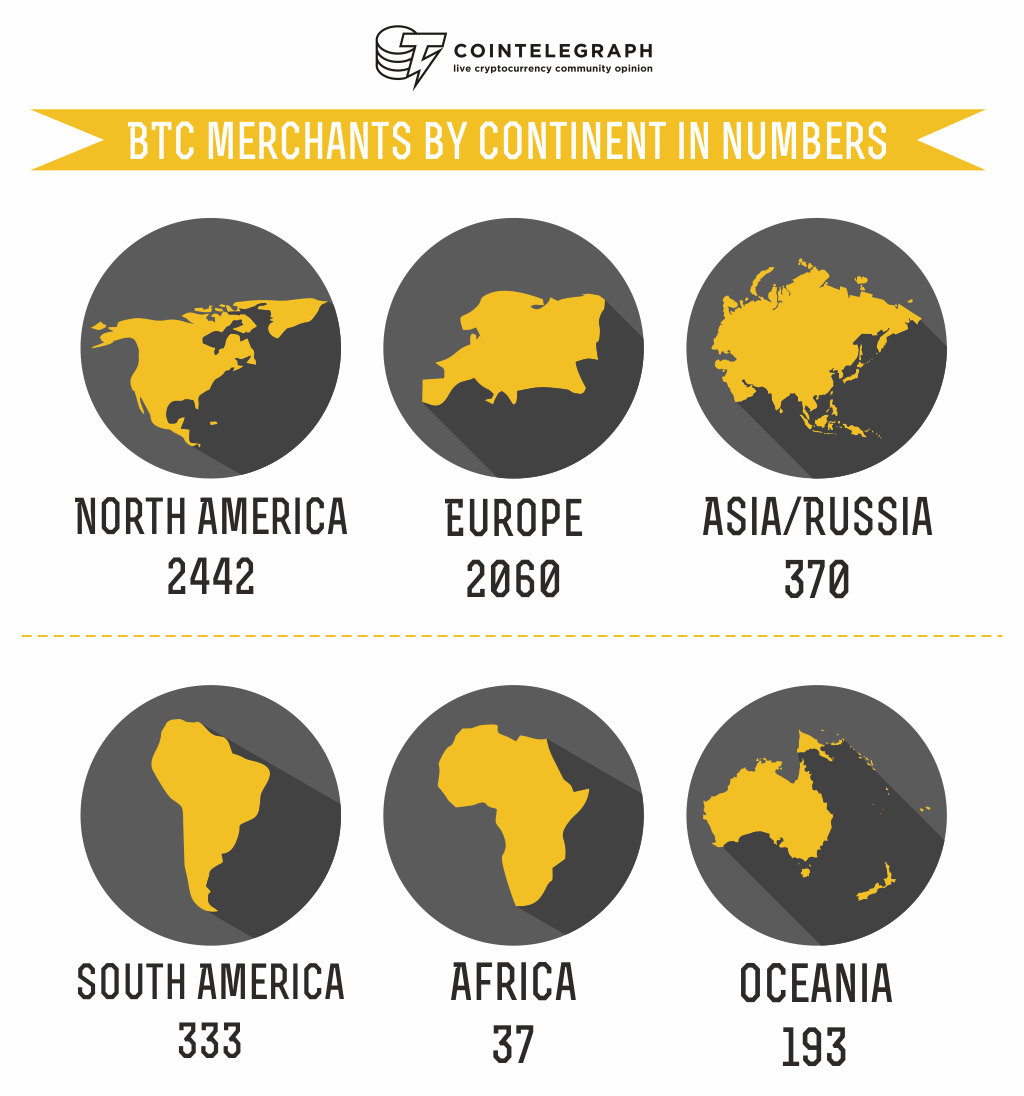Undoubtedly, Bitcoin can be called the world’s first truly global currency that has the potential to reduce friction and complement global e-commerce and the Internet age. But while Bitcoin can be used by almost everyone to buy almost anything online, we were interested in discovering which countries are the most accommodating when it comes to locations where people can spend Bitcoin.
Why Merchants Matter
Merchant adoption may seem rather insignificant, especially if we consider that most of these businesses don’t actually hold any bitcoins i.e. it is common practice to instantly convert digital coins into local fiat currency via a payment processor such as BitPay or Coinbase.
Nevertheless, merchant adoption is probably one of the most important indicators of “Bitcoin awareness” for a number of reasons.
First and foremost, growing merchant adoption is a good indicator of increasing demand for Bitcoin as a payment mode. So while certain tech-savvy merchants decide to accept Bitcoin under their own initiative, they are more commonly persuaded by their clientele.
Second, while companies like Dell and Expedia give Bitcoin a major publicity boost, most Bitcoin merchants are small businesses, which can give a good indication of the demand for Bitcoin on a more local level.
Third, the barriers to start accepting Bitcoin are almost zero for merchants as it is possible to enter the space even without purchasing POS equipment. In fact, it is becoming possible to now send bitcoins while offline with SMS using services such as 37coins. Moreover, merchant numbers can be a better indicator than the number of ATMs, for example, where each machine could cost upwards of US$3,000.
And finally, the more brick and mortar locations where the public can actually spend their digital coins adds more value to the entire network, boosting the confidence of consumers who know that their bitcoins will be accepted at some local brick-and-mortar or online store – this can give a clearer picture of Bitcoin penetration in comparison to on-and-off ramps such as BTMs.

The Data
To compile the list, we used coinmap.org as the data source for global BTC merchant locations, which updates venues every hour and currently has over 5,400 BTC merchant listings worldwide. The population of a country was taken and divided by the number of retail locations where consumers can spend their bitcoins, thus giving us a better, albeit abstract representation, of merchants in relation to the population as a whole.
As a bonus, the number of Bitcoin ATMs is also included although they were not taken into account towards a country’s ranking.
Note: We decided against taking the number of Bitcoin nodes into account as the figure does not accurately reflect BTC infrastructure support in a given country or region and heavily favors the United States (39.80%) while every other country is far behind with the runner up (Germany) being in single digits.
The top 10 countries for BTC merchants’ adoption to date are as follows:
10. Italy
- Population: 60,762,320
- Merchants: 269
- ATMs: 4
- 1 BTC merchant / 225,882 people
While Italy has not been as quick to embrace cryptocurrencies as its other European counterparts, the country seems to be picking up steam as of late, adding its locally-built BTM and with one Italian newspaper, Il Giornale starting to accept BTC. Though the parliamentary hearings back in June on cryptocurrencies failed to produce any significant results, the number of merchants in the country appears to be on the upswing.
9. United States
- Population: 318,753,000
- Merchants: 1468
- ATMs: 43
- 1 BTC merchant / 217,134 people
The US is the clear cut leader as far as merchant numbers are concerned. However, its per capita number is relatively low compared to other nations in this list including its northern neighbor, Canada.
Nevertheless, given the significantly larger number of places where people can spend their Bitcoin and with California officially approved the use of Bitcoin in the state, the US is at the forefront of the movement and is currently in process of developing Bitcoin regulations on both federal and state levels.
All eyes will be on the United States and the state of New York with relation to Bitcoin regulation in the near future, which could have a vast impact on worldwide merchant adoption.
8. United Kingdom
- Population: 64,105,700
- Merchants: 362
- ATMs: 11
- 1 BTC merchant / 177,087 people
The UK’s love and hate relationship with digital currencies has been widely covered on Cointelegraph. Regardless, the island nation has a vibrant Bitcoin community and has a relatively high number of merchants across the country despite pressure from its traditional banking industry. Moreover, real estate opportunities have also been popping up while some students have even begun paying tuition with Bitcoin.
7. Finland
- Population: 5,462,939
- Merchants: 34
- ATMs: 7
- 1 BTC merchant / 160,645 people
Finland is not a densely populated nation, but it is nevertheless the home to a vibrant tech community and the communications and IT giant, Nokia. Finland is also the country where a new technology called Kryptoradio enables merchants and consumers to receive real time P2P network transaction data with any standard Digital TV device and custom software without the requirement of Internet or mobile network connection.
6. Australia
- Population: 23,600,800
- Merchants: 162
- ATMs: 16
- 1 BTC merchant / 145,684 people
Australia has been in the news a lot when it comes to Bitcoin. This is because it is one of the first countries that are attempting to regulate cryptocurrencies. It is also home to some powerful players in the Bitcoin space such as CoinJar and BitPOS while also hosting a significant number of BTMs.
5. Singapore
- Population: 5,399,200
- Merchants: 41
- ATMs: 9
- 1 BTC merchant / 131,688 people
The Singaporean economy is known as one of the most innovative and most business-friendly in the world. So it not surprising that the government has also shown interest in Singapore becoming a Bitcoin hub in the region with the Monetary Authority of Singapore’s managing director, Ravi Menon, stating that “digital currencies have a role to play.”
It is also home to a vibrant Bitcoin community that helped establish the Association of Cryptocurrency Enterprises and Startups which aims to facilitate a dialogue between Singapore crytocurrency businesses and the wider public, including regulators.
4. The Netherlands
- Population: 16,868,300
- Merchants: 132
- ATMs: 9
- 1 BTC merchant / 127,790 people
The Netherlands has always been at the forefront of technological innovation with some calling it a pillar of Bitcoin in Europe. Indeed, having hosted a successful Bitcoin City Day event on May 28, many people had the chance to experience what it would be like if every local business accepted Bitcoin. Amsterdam also serves as the European headquarters for one of the leading BTC payment processors, BitPay.
3. Canada
- Population: 35,427,524
- Merchants: 968
- ATMs: 53
- 1 BTC merchant / 36,598 people
Canada is the worldwide leader in Bitcoin ATM locations so it comes as no surprise that its BTC merchant figures are also impressive. With a relatively small population in comparison to its neighbor, Canada is the home to many Bitcoin startups such as BitAccess, Cavirtex and Vault of Satoshi while also becoming the first country to regulate Bitcoin back in June.
2. Slovenia
- Population: 2,063,987
- Merchants: 58
- ATMs: 4
- 1 BTC merchant / 35,586 people
Slovenia has demonstrated its ambitious plans to become a Central European Bitcoin hub. Home to one of the most prominent Bitcoin exchanges, Bitstamp, the country recently hosted the Central and Eastern Europe Bitcoin Conference in the capital Ljubljana with one of the biggest European Telecoms providers Telekom Slovenije seemingly showing interest in cryptocurrencies by sponsoring the event.
1. Isle of Man
- Population: 84,497
- Merchants: 3
- ATMs: 1
- 1 BTC merchant / 28,166 people
The Isle of Man did takes the top spot due despite recent developments that could have a negative impact on Bitcoin adoption on the island. Nevertheless, the Isle of Man has demonstrated its goal of becoming a ‘Bitcoin Isle’ while developing a framework for the regulation of digital currencies to foster the growing Bitcoin economy. There are also talks of future possibilities for residents to pay for taxes and transportation on the isle in Bitcoin.
[Editor's note: the original article included Estonia in the list. However, after further review, the numbers did not correlate with our previous assessment resulting in Estonia being excluded from the list.]
BTC Merchant Numbers by Continent

Disclaimer: BTC merchant numbers are dynamic and are subject to change from day to day. The given study was by no means ‘scientific’ and was only conducted to present an abstract picture of the BTC merchant landscape.
Did you enjoy this article? You may also be interested in reading these ones:
